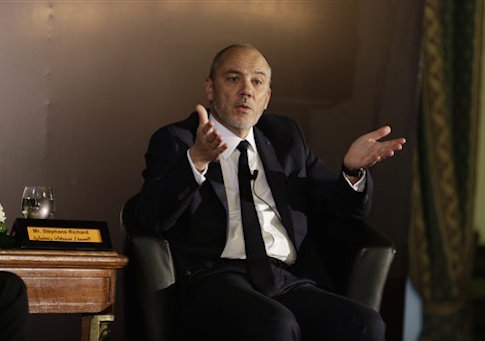JERUSAEM—A French telecom executive who said in Cairo last week that he would sever his business links in Israel "tomorrow morning" if he could has accepted an invitation from the office of Prime Minister Benjamin Netanyahu to come to Jerusalem to apologize for what Netanyahu termed "a miserable statement."
The executive, Stéphane Richard, CEO of Orange, had earlier requested a meeting with Israel’s ambassador in Paris to "clarify" his remarks but Netanyahu instructed the ambassador not to meet Richard. "If he wants to explain," said Netanyahu, according to a source close to the prime minister, "he can come here."
An Orange spokesman said Richard welcomed the invitation. "He will provide all the necessary clarifications to end this controversy and reaffirm the group’s commitment."
Referring in Cairo to his firm’s contractual relations with Israel’s Partner Communications, a mobile network operator, Richard said, "I want to abandon this tomorrow morning but I don’t want to expose Orange to a level of risk and of penalties that could be really sizable."
A subsequent statement by Orange said Richard’s remarks had not been political but a reflection of Orange’s present strategy of not licensing its brand where it is not directly in control of the business, as is the case with Israel. Israeli commentators noted, however, that his phrasing, which Netanyahu termed "unequivocally hostile," seemed clearly intended to win the sympathy of his Arab listeners since Orange is engaged in building up its business in the Middle East and Africa.
Orange owns 98 percent of MobiNil, an Egyptian communications company, which serves 33 million customers. "We want to be one of the trustful partners of all Arab countries," Richard said during his Cairo talk.
The sharp reaction in Jerusalem to Richard’s remarks comes amid the rise of the BDS (boycott, divestment, and sanctions) movement, which advocates economic moves against Israel on behalf of the Palestinians.
Critics of the movement see it as an attempt to delegitimize, if not to demonize, Israel in the international arena. Some fear that in the absence of peace talks with the Palestinians and with ongoing settlement activity, world public opinion may turn increasingly hostile if the BDS movement is not addressed.
The BDS movement coalesced in 2005 and has had its strongest influence in Europe. It has also become made inroads at many American college campuses. Some leading churches have considered shifting investments away from companies that do business in Israel and some academics call for avoiding collaboration with Israeli academic institutions.
A Knesset report in January said boycotts have had no discernible impact on Israel’s economy even though it is export dependent. In the decade since 2005, exports to the European Union have nearly doubled. A third of Israel’s GDP is generated from exports, which makes it theoretically vulnerable to boycotts.
The Knesset report notes that a major portion of exports are electronic components and other intermediate products that are incorporated into the final product of well-known global companies, which nullifies boycott attempts. There has been a relatively small impact on agricultural produce from Israeli West Bank settlements as a result of EU insistence that their place of origin be noted on the packaging.
The BDS movement had targeted SodaStream, an Israeli firm on the West Bank, which subsequently moved into Israel proper. The plant’s owner denied that BDS had been responsible for his move, which, he noted, cost the jobs of hundreds of Palestinians who had worked in the factory.
More than 100,000 Palestinians work for Israeli employers. A Moody official, Kristin Linow, said BDS has had limited impact on Israel’s credit profile. "Its impact is more psychological than real so far," she said.
There is concern in Israel, however, that if enough firms or individuals bow to BDS, the effects might reach a critical mass that renders such protests part of the mainstream, particularly for commercial firms that have a much larger market in the Arab world than in Israel, with its population of 8 million.
